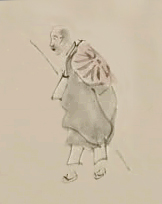A monk asked Joshu, a Chinese Zen master: `Has a dog Buddha-nature or not?'
Joshu answered: `Mu.' [Mu is the negative symbol in Chinese, meaning `No-thing' or `Nay'.]
Mumon's comment:s
To realize Zen one has to pass through the barrier of the patriachs. Enlightenment always comes after the road of thinking is blocked. If you do not pass the barrier of the patriachs or if your thinking road is not blocked, whatever you think, whatever you do, is like a tangling ghost. You may ask: What is a barrier of a patriach? This one word, Mu, is it.
This is the barrier of Zen. If you pass through it you will see Joshu face to face. Then you can work hand in hand with the whole line of patriachs. Is this not a pleasant thing to do?
If you want to pass this barrier, you must work through every bone in your body, through ever pore in your skin, filled with this question: What is Mu? and carry it day and night. Do not believe it is the common negative symbol meaning nothing. It is not nothingness, the opposite of existence. If you really want to pass this barrier, you should feel like drinking a hot iron ball that you can neither swallor nor spit out.
Then your previous lesser knowledge disappears. As a fruit ripening in season, your subjectivity and objectivity naturally become one. It is like a dumb man who has had a dream. He knows about it but cannot tell it.
When he enters this condition his ego-shell is crushed and he can shake the heaven and move the earth. He is like a great warrior with a sharp sword. If a Buddha stands in his way, he will cut him down; if a patriach offers him any obstacle, he will kill him; and he will be free in this way of birth and death. He can enter any world as if it were his own playground. I will tell you how to do this with this koan:
Just concentrate your whole energy into this Mu, and do not allow any discontinuation. When you enter this Mu and there is no discontinuation, your attainment will be as a candle burning and illuminating the whole universe.
Has a dog Buddha-nature?
This is the most serious question of all.
If you say yes or no,
You lose your own Buddha-nature.
 |
| Mu by Kojima Kendo who was one of the leading Soto Zen female monastics of the 2oth century. She was 97 and in the last year of her life when she traced her Mu Enso. The calligraphy combined the enso and the regular script for mu off-set to create white space for the mind to fall into. Kojima Kendo dedicated her life to social service and creating equity of practice opportunities among monks and nuns. In her time as abbess, she fought for moral and financial support of the order of nuns whose ordinations and transmissions were not recognized. Sadly, not too much different from today. |
Un monje preguntó a Joshu, (un maestro chino Zen): `Tiene un perro naturaleza búdica o no '?
Joshu respondió: `Mu '. [Mu es el símbolo negativo en chino, que significa `la Nada 'o` Nay'.]
El comentario de Mumon:
Para realizar Zen hay que pasar a través de la barrera de los patriarcas. La iluminación siempre viene después de la vía del pensamiento que está bloqueado. Si usted no pasa la barrera de los patriarcas o si su vía de pensamiento no está bloqueada, cualquier cosa que haga, es como un fantasma enredado en la maleza. Usted puede preguntar: ¿Qué es una barrera de un patriarca? Esa sola palabra, Mu, es la barrera.
Esta es la barrera del Zen. Si pasa a través de ella se verá cara a cara con Jóshu. A continuación, puede trabajar de la mano con toda la línea de los Patriarcas. No es ésto una cosa agradable para hacer?
Si desea pasar esta barrera, debe trabajar a través de todos los huesos de su cuerpo, a través de cada poro de su piel, llenado con esta pregunta: ¿Qué es Mu? y llevarla día y noche. No crea que es el símbolo negativo común que significa nada. No es la nada, lo contrario de la existencia. Si realmente desea pasar esta barrera, debe sentirse como beber una bola de hierro caliente que no puede ni tragar ni escupir.
Luego, su poco conocimiento previo desaparece. Como fruta madura de temporada, su subjetividad y objetividad, naturalmente se convierten en uno. Es como un mudo, que ha tenido un sueño. Él sabe sobre el sueño, pero no puede contarlo.
Cuando esta condición entra en él su ego es aplastado y puede agitar el cielo y mover la tierra. Él es como un gran guerrero con una espada afilada. Si un Buda se interpone en su camino, él lo derribará; si un patriarca le ofrece algún obstáculo, él lo matará; y él estará libre de esta forma de nacimiento y muerte. Él puede entrar en cualquier mundo como si fuera su propia zona de juegos. Voy a decirle cómo hacer esto con este koan:
Sólo concentre toda su energía en este Mu, y no permita ninguna interrupción. Si entra en este Mu sin interrupción, su consecución será como una vela encendida que ilumina todo el universo.
Tiene un perro la naturaleza de Buda?
Esta es la cuestión más grave de todas.
Si usted dice sí o no,
Pierde su propia naturaleza búdica.



